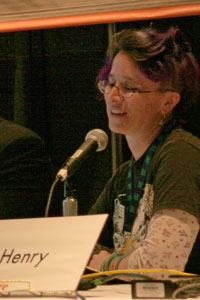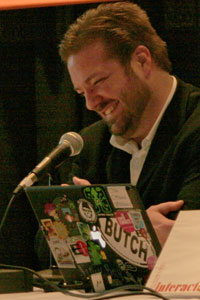 |
|||||||||||||
 I attended the Fictional Bloggers panel at SXSW. The panel featured Liz Henry and Odin Soli. They are both active in Latin American political writing, which is an area I admit I don’t follow. I spent some time in Brazil when my mother was stationed there and got some creepy awful illness which caused blood to exit from strange places and caused me to take medication which made everything taste like metal for a month. Also, despite huge natural resources and local wealth, there were homeless children there and that kinda freaked me out. I haven’t followed much in the way of anything Latin American since. Even though I live an easy drive from Tijuana, the only people who generally try to get me to go south of the border with them tend to be professional adult webmasters. These are the sort of guys who just can’t help bribing public officials and finding out where the donkey show is. As a result, despite having lived all over the world and living in Los Angeles now, I have never even visited Mexico for an hour.
I attended the Fictional Bloggers panel at SXSW. The panel featured Liz Henry and Odin Soli. They are both active in Latin American political writing, which is an area I admit I don’t follow. I spent some time in Brazil when my mother was stationed there and got some creepy awful illness which caused blood to exit from strange places and caused me to take medication which made everything taste like metal for a month. Also, despite huge natural resources and local wealth, there were homeless children there and that kinda freaked me out. I haven’t followed much in the way of anything Latin American since. Even though I live an easy drive from Tijuana, the only people who generally try to get me to go south of the border with them tend to be professional adult webmasters. These are the sort of guys who just can’t help bribing public officials and finding out where the donkey show is. As a result, despite having lived all over the world and living in Los Angeles now, I have never even visited Mexico for an hour.
Liz Henry’s work these days is working for Socialtext, which is a company attempting the interesting enterprise of introducing wiki technology to the corporate environment. She also blogs for Feminist SF which lists yours truly in their index of female authors of science fiction, so they have to be awesome. Bonus points: Liz Henry wears purple hair well. Odin Soli works for a company called Aveso, which is either a webhost, or more likely a company striving to sell big business on the cyberpunk giftcard accessory of teensy weensy electronic displays. I know it doesn’t seem like this is a more likely thing to even exist, but the Interactive portion of SXSW is about new tech and next time someone mails me a Starbucks giftcard as their holiday thanks for helping them have a good year, I’d like that card to have an animation of ice cubes in a latte. Actually, I’d like to claim ironic detachment on that one, but I really do think miniature electronic displays on cards would be pretty spiffy.
 However, what Odin Soli is best known for is creating a fictional blog. And that was the main topic of the panel. From 2001 through 2004, he wrote an online diary of the supposed life of a young woman named Layne Johnson or Plain Layne. Odin Soli explains his concept of the character of Layne on his site saying, “Layne Johnson was an unlikely protagonist for that kind of fame. She was cute but gap-toothed, a twentynothing infowaif laboring in the lower GI tract of Corporate America. She struggled with her conservative Lutheran family and a revolving door of boyfriends — and later, girlfriends. She described herself as “un-out-dorkable” and tended to finish sentences with “hey?” And most of all, she shared her innermost thoughts and feelings with brutal honesty.” He thought it would be an interesting creative exercise, writing in the first person, with a female voice, in a medium like the internet where the readers could interact with the fictional character of Layne. He had previously written a travelogue in this style from 2000 to 2001, but, The Sex Pistols are Alive and Well and Living in Sohatsenango, the travel diary of the fictional female journalist Acanit became ethically uncomfortable for him after the events of 9/11. So he created Layne. Usually, an author would be very pleased if something he or she wrote garnered hundreds of thousands of fans. Unfortunately for Odin, his fans kinda thought Plain Layne was a real person and they cared about her like they would a real person. And, when he grew weary of the creative exercise, his creation’s fans clamoured for more. And, when he actually stopped writing Layne’s story, “her” readers turned sleuth, did some detective work, and outed the real author as being a man. The mainstream press went beserk and Odin had a pretty unpleasant time of it.
However, what Odin Soli is best known for is creating a fictional blog. And that was the main topic of the panel. From 2001 through 2004, he wrote an online diary of the supposed life of a young woman named Layne Johnson or Plain Layne. Odin Soli explains his concept of the character of Layne on his site saying, “Layne Johnson was an unlikely protagonist for that kind of fame. She was cute but gap-toothed, a twentynothing infowaif laboring in the lower GI tract of Corporate America. She struggled with her conservative Lutheran family and a revolving door of boyfriends — and later, girlfriends. She described herself as “un-out-dorkable” and tended to finish sentences with “hey?” And most of all, she shared her innermost thoughts and feelings with brutal honesty.” He thought it would be an interesting creative exercise, writing in the first person, with a female voice, in a medium like the internet where the readers could interact with the fictional character of Layne. He had previously written a travelogue in this style from 2000 to 2001, but, The Sex Pistols are Alive and Well and Living in Sohatsenango, the travel diary of the fictional female journalist Acanit became ethically uncomfortable for him after the events of 9/11. So he created Layne. Usually, an author would be very pleased if something he or she wrote garnered hundreds of thousands of fans. Unfortunately for Odin, his fans kinda thought Plain Layne was a real person and they cared about her like they would a real person. And, when he grew weary of the creative exercise, his creation’s fans clamoured for more. And, when he actually stopped writing Layne’s story, “her” readers turned sleuth, did some detective work, and outed the real author as being a man. The mainstream press went beserk and Odin had a pretty unpleasant time of it.
Liz Henry, whose BlogHer blog identifies her as “feminist, geek, punk, poet, mom”, made the point that, in situations where fictional journals are being put out there, the “dominant culture can be speaking for people who actually know much more about what it is like to be them.” She also pointed out to Odin Soli that all testimony is undermined if you undermine the social trust. His view was that, if the writing could potentially impact international public policy, then that was ethically dicey, but, even after all he had been through, he seemed to still feel that there ought to be a way to be entertaining with a fictional blog.
I admit I’ve played both LARPs and table top games with the best of them. But, in those situations, everyone knows you are not really a 10th level illustionist/assassin of half-orc descent. To write good fiction, a writer absolutely must be able to express voices besides his or her own. When I had one of my fiction pieces in Susie Bright’s Best American Erotica, I participated in a reading for it at Slim’s in San Francisco. I never do readings because, although I enjoy public speaking, actually reading my work aloud makes me experience agonizing shyness, but, hey, it was Susie Bright asking and she’s a real inspiration. At any rate, the story I had written was from a first person male point of view. I wrote it under my own name and Amelia sure ain’t a boy’s name. There was no question that the story was intended to be taken as fiction. Yet, some people who reviewed the show said that they found it sort of odd to see me up there in my red sequin corset talking about my cock and not meaning a strap-on. But it only struck them as humorously off-kilter, not actually enraging. Because they honestly did know, in a general way, what was real and what was not. Then again, they certainly couldn’t know which characters in my short story were based on which real life people and which parts were wholly fiction and which ones less so.
So how far is too far when it comes to online roleplay? Lots of writers use pseudonyms. Is that wrong? Does it become wrong when they use more than one? Does it become wrong when the illusion is broken? Does it become wrong if they have an actor perform the role of being their pseudonym on book tours the way J.T. Elroy did? One of the reasons so many people felt J.T. Elroy was more a hoax than a pseudonym was because they felt they were having a relationship with a real person, but their friend turned out not to really exist. Another reason people felt J.T. Elroy was so wrong was perhaps because the hoax was so very successful. Is it wrong for someone to pretend in their online profile that they are someone they are not? Is it more wrong if they pretend successfully enough to get laid IRL?
When does fiction bridge the gap and intrude too far into real life?
Shortlink:
Blue Blood is delicious luxury pop culture candy for intelligent adults. BlueBlood.net covers cool personalities, oddities, style, music, books, movies, television, media business and culture and everything you crave. Blue Blood is elite counterculture lifestyle and pop media for iconoclasts.